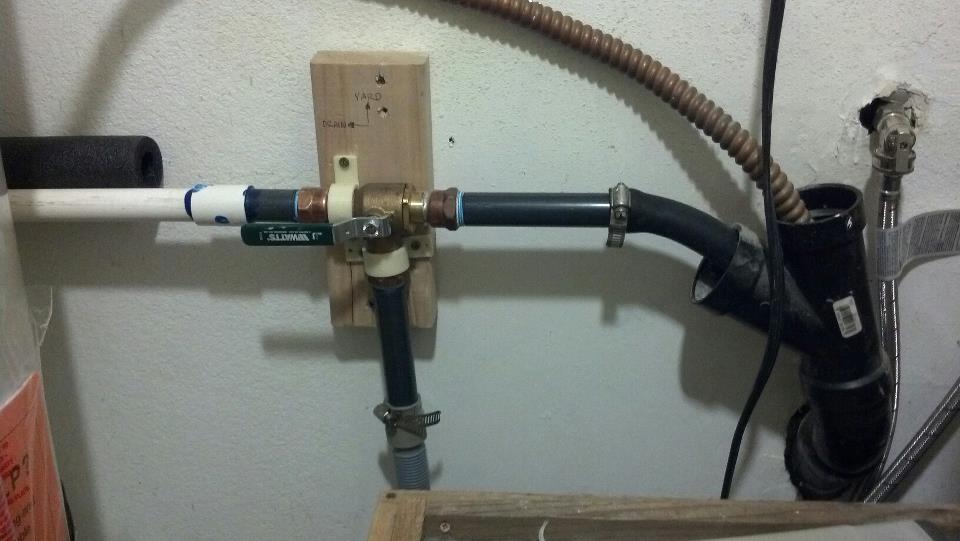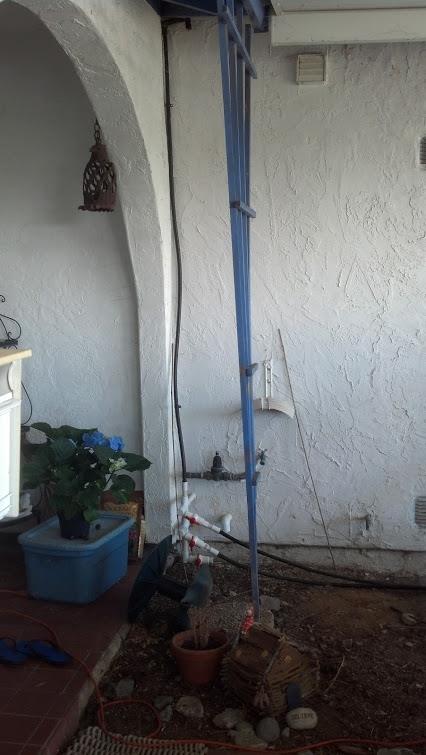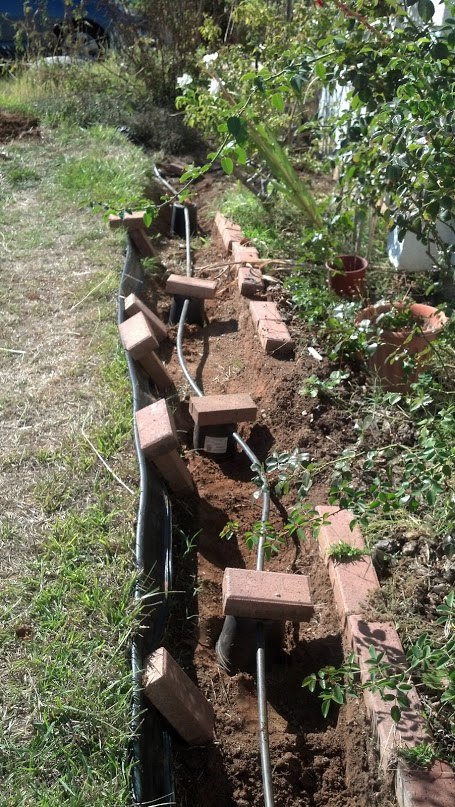 Water from the washing machine comes up into the bottom
of the valve and is then directed either down the drain to the right or out
to the yard on the left.
Water from the washing machine comes up into the bottom
of the valve and is then directed either down the drain to the right or out
to the yard on the left.
Most grey water systems start with a diverter valve so that wash water with bleach or other toxic chemicals can still be sent down the standard drain, and only bio-frendly soaps are diverted out to the landscaping.
 Water from the washing machine comes up into the bottom
of the valve and is then directed either down the drain to the right or out
to the yard on the left.
Water from the washing machine comes up into the bottom
of the valve and is then directed either down the drain to the right or out
to the yard on the left.
The valve should be large enough that it does not restrict the flow from the waching machine, e.g. not smaller than the size of the outlet. This is a 1" 3-way valve^
Cost including adapters and fittings was around $50.

Outside the laundry room, there are 3 PVC valves which will allow the water to be directed to different areas as needed. The valves unscrew so if they get clogged up they can be cleared.
The tall vertical tube is a vacuum break which keeps the system from pulling the fill water out of the washer after it is done emptying the load. Most would use a ball valve, but that would be more expensive, prone to jamming, and this will also act as an indicator if the outlet lines are plugged up.
The cost is <~$20 for PVC fittings, valves, etc...

Standard drip irrigation pipe run through old plastic pots from previously purchased plants... placed upside down. This provides an air gap between the hole in the pipe and the ground so that roots will not grow up into the pipe.
The new bed will be filled in with mulch to absorb and hold the water safely. Open water is a health hazard as it can result in bacterial blooms, mosquitoes, and in any case, it will evaporate. The top layer of mulch drys out and keeps the water stored until the earth around it needs it.
Pipe was "rescued" from a prior irrigation project, so the total cost here is $0.?
Also:
in the past, The permit process was compex and
expensive enough that most home based gray water systems are not legal. Here
is the permitting process and design criteria document published by the county
prior to 2010:
http://www.co.san-diego.ca.us/deh/water/docs/lu_graywater_design_criteria.pdf
However, the permitting and inspection requirements are changed so often
that no one has time to figure out the red tape before the next change. The
result is that not one single gray water permit was issued from 2005 to 2008
in a county that is starving for
water.^
It is not known if any permits have been issued since then, but given the
extreem requirements to prove that no groundwater exists on the property,
it is unlikely that any home owner could afford to install a permitted
system.
UPDATE: in January of 2010 the drought forced San Diego county to
issue an emergency rule permitting safe residential grey water systems (from
shower, bathroom sink, and clothes washing except for diapers):
http://hcd.ca.gov/codes/shl/graywater_emergency.html
Current requirements are listed here:
http://www.sandiego.gov/water/recycled/graywater.shtml
See:
See also:
| file: /Techref/other/greywater.htm, 8KB, , updated: 2014/8/20 11:35, local time: 2025/4/22 21:03,
owner: JMN-EFP-786,
160.79.111.175,10-1-103-133:LOG IN
|
| ©2025 These pages are served without commercial sponsorship. (No popup ads, etc...).Bandwidth abuse increases hosting cost forcing sponsorship or shutdown. This server aggressively defends against automated copying for any reason including offline viewing, duplication, etc... Please respect this requirement and DO NOT RIP THIS SITE. Questions? <A HREF="http://sxlist.com/TECHREF/other/greywater.htm"> Grey-water Recovery and Treatment</A> |
| Did you find what you needed? |
Welcome to sxlist.com!sales, advertizing, & kind contributors just like you! Please don't rip/copy (here's why Copies of the site on CD are available at minimal cost. |
|
Ashley Roll has put together a really nice little unit here. Leave off the MAX232 and keep these handy for the few times you need true RS232! |
.